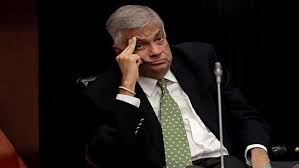-By A Staff correspondent

(Lanka-e-News -18.Feb.2025, 11.15 PM) Politics is a game of betrayals, but some betrayals are so stark that they leave an indelible stain. The story of how Ranil Wickremesinghe ignored the calls for an investigation into Mangala Samaraweera’s death is one such political tragedy—one that exposes the lengths to which power-hungry leaders will go to protect their own survival.
Mangala Samaraweera, a seasoned politician and former minister, was a man who never shied away from speaking his mind. Known for his liberal values, sharp wit, and fearless criticism of political corruption, he was a rare breed in Sri Lankan politics. His sudden death on August 24, 2021, was officially attributed to complications from COVID-19, despite being fully vaccinated. However, whispers of foul play never subsided.
Many suspected that Mangala’s death was more than just a tragic case of pandemic misfortune. Those close to him believed that he had made powerful enemies—enemies who saw him as a threat to their political ambitions. While no formal accusations were made, the demand for an independent investigation into the circumstances surrounding his death gained traction. But one man, who should have been at the forefront of this quest for justice, remained conspicuously silent—Ranil Wickremesinghe.
Ranil Wickremesinghe’s political career has been a masterclass in survival. Having lost multiple elections, he found his way to the presidency not through the mandate of the people, but through a parliamentary maneuver after the 2022 economic crisis. When he assumed office, many expected him to use his newfound power to address pressing national issues—including the lingering questions around Mangala’s death. Instead, Ranil did what he does best: nothing.
Why did Ranil ignore calls for an investigation into Mangala’s death? The answer lies in the complex web of political alliances he was desperately trying to maintain.
Mangala was not just another politician; he was a loyal friend and a crucial ally to Ranil. He had protected Ranil from various controversies, including the infamous Batalanda torture camp allegations. When others abandoned Ranil, Mangala stood by him, shielding him from political attacks and ensuring his survival in turbulent times.
And yet, when the time came for Ranil to return the favor, he chose to look the other way. Instead of launching an investigation, he busied himself entertaining the Rajapaksa family—the very people Mangala had opposed throughout his career.
Ranil’s inaction was not just about ignoring Mangala’s case; it was a calculated political move. At the time, he was desperately trying to secure a presidential election victory, despite having no real public support. To achieve this, he believed he needed the backing of Mahinda Rajapaksa’s SLPP, Sirisena’s SLFP, and potentially even Sajith Premadasa’s SJB.
But there was a problem: investigating Mangala’s death could have risked alienating the very people Ranil was trying to win over. Some of the key players who had come to his "rescue"—figures like Prasanna Ranatunga, Nimal Lanza, and Anura Yapa—were deeply embedded in the old political order that Mangala had fought against. By keeping them close, Ranil was ensuring his own survival.
In short, launching an investigation into Mangala’s death could have cost Ranil his fragile alliances. And for a man obsessed with maintaining power, that was a price too high to pay.
Ranil’s strategy was simple: win over SLPP and SLFP, present himself as a “common candidate,” and secure a legitimate electoral victory. But his plan failed miserably.
Sajith Premadasa and the SLPP chose to go their own way, disregarding Ranil’s overtures. Liberal voters, who might have been swayed if Ranil had shown even a shred of moral courage by investigating Mangala’s death, turned away in disappointment. Internationally, he lost the opportunity to earn credibility by standing up for justice.
And the result? A humiliating election defeat, with Ranil securing a meager 2% of the vote—a resounding rejection of his opportunistic politics.
A close foreign diplomat who was a confidant of Mangala put it best: “Ranil’s betrayal of Mangala is a lesson to all. If he can turn his back on someone who protected him for years, he can betray anyone.”
This should serve as a warning to figures like Rajitha Senaratne and others who still place their trust in Ranil. The only thing Ranil is loyal to is his own survival. And when the time comes, he won’t hesitate to throw even his closest allies under the bus.
Ranil Wickremesinghe may be a skilled political survivor, but his legacy is one of betrayal, broken promises, and missed opportunities. His refusal to investigate Mangala’s death was not just a failure of leadership; it was a moral failing that exposed his true nature.
For those still holding onto the illusion that Ranil is a leader who stands for justice, let this be a reminder: when faced with a choice between doing what is right and doing what serves his interests, Ranil will always choose the latter.
And that, more than anything else, is why he remains the greatest opportunist Sri Lankan politics has ever seen.
-By A Staff correspondent
---------------------------
by (2025-02-18 17:27:55)
Leave a Reply